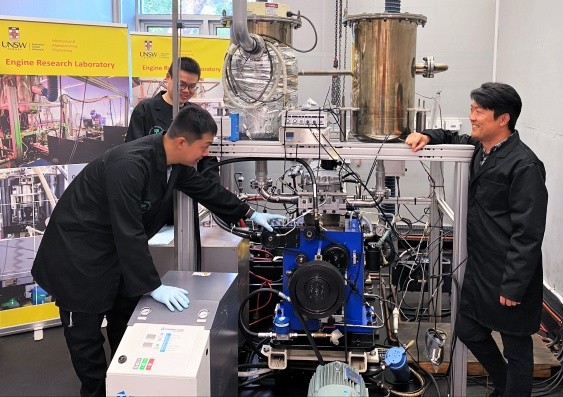A retrofit system that converts diesel engines to operate on 90% hydrogen has been prototyped and tested by University of South Wales (UNSW) researchers. This system drastically reduces emissions of nitrous oxide and carbon dioxide while also increasing efficiency by an astonishing 26%, as reported first by New Atlas.
The procedure, which involves running 10% diesel, does not completely green-convert diesel engines, but it does provide a way for some firms to drastically reduce their carbon output without needlessly destroying old assets that may still be valuable for them.
The injection of hydrogen directly into the cylinder and separate timing management for the diesel and hydrogen systems are both added by the retrofit system, which retains the diesel injection system.

"Stratified" Approach
The team has shown that its "stratified" hydrogen injection approach, which creates pockets of greater and lower hydrogen concentrations in the cylinder, lowers the frequency of nitrous oxide emissions below that of a straight diesel. At the same time, it doesn't require very high-purity hydrogen.
The team, headed by Professor Shawn Kook from the School of Mechanical and Manufacturing Engineering, took about 18 months to design the Hydrogen-Diesel Direct Injection Dual-Fuel System.
"This new technology significantly reduces CO2 emissions from existing diesel engines, so it could play a big part in making our carbon footprint much smaller, especially in Australia with all our mining, agriculture and other heavy industries where diesel engines are widely used," Prof. Kook said in a statement.
Diesel Injection, Direct Hydrogen Injection
The UNSW team's new technology keeps the original diesel injection in the engine but also includes direct injection of hydrogen fuel into the cylinder.
It's important to note that the new Hydrogen-Diesel Direct Injection Dual-Fuel System doesn't require the extremely high-quality hydrogen needed for alternative hydrogen fuel cell systems, which is more expensive to generate.
The system's 26% efficiency is attained through independent management of the timing of the direct injection of hydrogen and the timing of the diesel fuel, which allows for full control of the combustion modes of premixed or mixing-controlled hydrogen combustion.
The research team is eager to speak with potential investors and anticipates commercializing the novel system over the next 12 to 24 months.
They claim that industrial locations with established hydrogen fuel supply connections are the new technology's most practical immediate application.
This includes mining sites, where research has revealed that the use of diesel engines, primarily in mining vehicles and power generators, is responsible for around 30% of greenhouse-gas emissions.
According to Prof. Kook, current diesel engines that are utilized to generate power at mining sites can be converted with their novel technology.
"In terms of applications where the hydrogen fuel would need to be stored and moved around, for example in a truck engine that currently runs purely on diesel, then we would also need to implement a hydrogen storage system to be integrated into our injection system."
Read also: 'Floating Solar Tech': Australia is set to Install its Largest Floating Array of Solar Panels
This article is owned by Tech Times
Written by Joaquin Victor Tacla
ⓒ 2025 TECHTIMES.com All rights reserved. Do not reproduce without permission.




